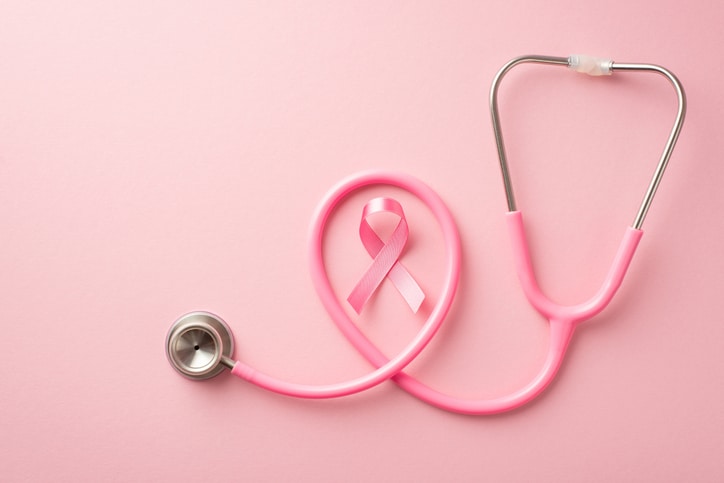October is breast cancer awareness month. Approximately 1 in 8 women will develop this type of cancer in their lifetime. Now is a great time to schedule a mammogram or other screening if you’ve not already done so.
Doing so can detect cancer early on, allowing for more effective, life-saving treatment. The cancer specialists at UAB Medical West are here to share some ways you can easily detect and prevent breast cancer.
How to Prevent & Detect Breast Cancer
While breast cancer can be genetic, there are steps you can take to prevent it. Along with making simple lifestyle changes, it is also important that you take a proactive approach to screening. Below, we highlight some tips on detecting and preventing breast cancer.
1. Self Breast Exams
Starting around age 20, you should perform monthly self breast exams to check for potential signs of cancer. To perform this exam:
- Stand in front of a mirror or lie on your back on a flat surface with your shirt off.
- Use your hands to gently yet firmly press down on your breast in a circular pattern.
- Look for changes in your breast, including:
- Lumps
- Dimpling or indentations
- Puckering
- Changes in the nipple, such as:
- Retraction or swelling
- Redness
- Warmth
- Pain
- Discharge
Once you’ve completed the steps above on one side, repeat the process on the other. If you notice anything during your self-examination, please contact your physician to schedule an appointment for further screening. While what you notice may not be cancerous, you want to be able to get the treatment you need in a timely manner.
2. Professional Screenings
You know the importance of an annual wellness exam in maintaining your health. Regular cancer screening, especially for breast cancer, should be included in that. Starting at age 40, it’s recommended that you get a mammogram annually. However, this timeline may vary depending on your personal risk factors.
For those who are at a higher risk for breast cancer or who have denser breasts, alternative screenings may be performed. These may include MRIs, ultrasounds, or other types of diagnostic imaging. Your physician can discuss your personal risk factors with you and make recommendations regarding testing based on these.
3. Regular Exercise
Along with many other healthy benefits regular exercise offers, it can help reduce the risk of breast cancer. It can help to regulate insulin and estrogen production, which can cause cancer cells to grow. Exercise doesn’t have to be difficult or take a lot of time. Just a short, half-hour walk per day is sufficient for most healthy adults.
4. Healthy Diet
Diet can make a difference for a variety of health concerns. It can also reduce your risk of cancer, including breast cancer. Below are some foods that have been shown to fight cancer cells:
- Whole Grains – Keep your insulin levels steady, slowing cancer growth.
- Berries – Contain antioxidants that are known to destroy cancer cells.
- Orange Vegetables – Contain carotenoids, which lower your cancer risk.
Along with incorporating these foods into your diet, you should also reduce your consumption of processed meats and alcohol to further decrease your risk of breast cancer. A nutritionist can help you create a plan on how to do this.
5. Know Your Family History
Breast cancer, like many cancers, can be genetic. If a parent or grandparent has had breast cancer, you may be at an increased risk of developing it yourself. Discussing your family medical history can help you determine your personal risk factors and take proactive steps to prevent breast cancer.
For further peace of mind, you can also have genetic testing done to determine if you carry the gene for breast cancer or other hereditary conditions. From there, a genetic counselor or your physician can help you determine the best next steps to take based on your results.
How Do I Know If I Have Breast Cancer?
While many individuals do not have symptoms of breast cancer, especially in the early stages, there are some signs that it may be developing. These include:
- Lumps
- Pain
- Changes in the skin, including:
- Dimpling
- Flaking
- Redness
- Dryness
- Swelling
- Retracted nipples
- Nipple discharge
If you notice any of these signs, please notify your physician for further screening. They can determine whether your symptoms are caused by developing breast cancer and treat them accordingly.
Get Screened for Breast Cancer at UAB Medical West
No matter what your age or personal risk factors are, regular screenings are a proactive step you can take to detect and prevent breast cancer. In addition to performing self breast exams, contact UAB Medical West to schedule an appointment at our diagnostic imaging center today. We want to be your partner in the fight against breast cancer.
Schedule Your Breast Cancer Screening at UAB Medical West
Early detection is the best first step in treating breast cancer. However, life gets in the way, and screening may not happen as routinely as you’d like. If you are due for a breast cancer screening, consider contacting UAB Medical West to schedule an appointment at our diagnostic imaging center today.
